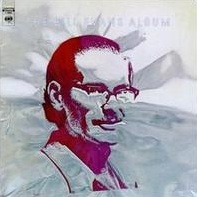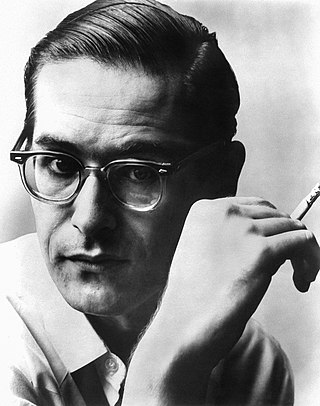
William John Evans was an American jazz pianist and composer who worked primarily as the leader of his trio. His use of impressionist harmony, block chords, innovative chord voicings, and trademark rhythmically independent "singing" melodic lines continue to influence jazz pianists today.

Portrait in Jazz is the fifth studio album by American jazz pianist Bill Evans as a leader, released in 1960. It is the first of only two studio albums to be recorded with his famous trio featuring bassist Scott LaFaro and drummer Paul Motian.

Explorations is an album by jazz pianist Bill Evans that was originally released by Riverside Records in 1961. It was the second and final studio album Evans recorded with his classic trio featuring Scott LaFaro on bass and Paul Motian on drums.
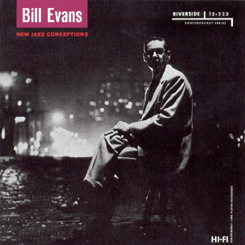
New Jazz Conceptions is the debut album by jazz pianist Bill Evans, recorded in two sessions during September 1956 for Riverside Records.

Sunday at the Village Vanguard is a live album by jazz pianist and composer Bill Evans and his Trio consisting of Evans, bassist Scott LaFaro, and drummer Paul Motian. Released in 1961, the album is routinely ranked as one of the best live jazz recordings of all time.

The Tony Bennett Bill Evans Album is a 1975 studio album by singer Tony Bennett and pianist Bill Evans.
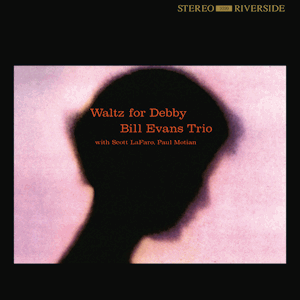
Waltz for Debby is a live album by jazz pianist and composer Bill Evans and his trio consisting of Evans, bassist Scott LaFaro, and drummer Paul Motian. It was released in 1962.

Orrin Keepnews was an American jazz writer and record producer known for founding Riverside Records and Milestone Records, for freelance work, and for his work at other labels.

Know What I Mean? is a 1962 jazz album by alto saxophonist Julian "Cannonball" Adderley, accompanied by Bill Evans and the rhythm section of the Modern Jazz Quartet. It was released on the Riverside label as RLP-433.

Everybody Digs Bill Evans is a trio and solo album by jazz pianist Bill Evans. It was released in early 1959 on the Riverside Records label.
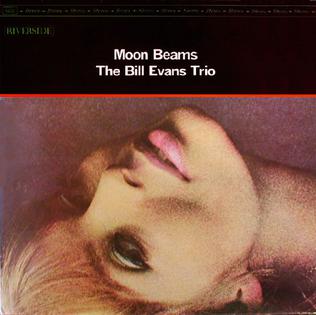
Moon Beams is a 1962 album by jazz musician Bill Evans and the first trio album he recorded after the death of bassist Scott LaFaro. It introduces two important Evans originals, "Re: Person I Knew", and "Very Early," which Evans had actually composed as an undergraduate. The originals serve as bookends to an album otherwise consisting of standards from the 1930s and 1940s.

You Must Believe in Spring is an album by American jazz pianist Bill Evans, recorded by him with bassist Eddie Gómez and drummer Eliot Zigmund in August 1977 and released in February 1981, shortly after Evans's death in September 1980.
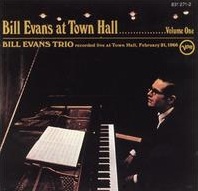
Bill Evans at Town Hall is a live album from 1966 by American jazz pianist Bill Evans and his trio. It is his only commercial trio recording featuring drummer Arnold Wise, and it was the last recorded appearance of bassist Chuck Israels as a regular member of the trio.

From Left to Right is an album by American jazz pianist Bill Evans, released in 1971. It was recorded with his regular bassist Eddie Gómez and drummer Marty Morell and with an orchestra arranged and conducted by Michael Leonard. This was the first album on which Evans played a Fender Rhodes electric piano.

Intuition is a jazz album by pianist Bill Evans and bassist Eddie Gómez released by Fantasy Records in 1975.

Waltz for Debby is a 1964 album in English and Swedish by the Swedish singer Monica Zetterlund and an American jazz trio led by pianist Bill Evans. Evans met Zetterlund on a tour of Sweden and was "bowled over" by her EP recording of "Waltz for Debby" with a Swedish text titled "Monicas Vals." Evans's manager, Helen Keane, set up a recording session for them at the end of the Swedish tour.
"Waltz for Debby" is a jazz standard composed by pianist Bill Evans, which became "his most famous tune." He first recorded it as a brief solo piano piece on his debut album, New Jazz Conceptions (1956). Lyrics were added about six years later by Evans's friend Gene Lees. "Debby" in the composition's title refers to Evans's then 3-year-old niece, Debby Evans, whom he often took to the beach.
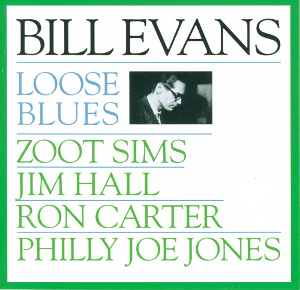
Loose Blues is an album by jazz pianist Bill Evans released on the Milestone label, featuring performances by Evans with Zoot Sims, Jim Hall, Ron Carter, and Philly Joe Jones, recorded in 1962.

Re: Person I Knew is a live album by jazz pianist Bill Evans with Eddie Gómez and Marty Morell recorded at the Village Vanguard in New York City in 1974 and released on the Fantasy label in 1981. Additional recordings from Evans' 1974 Village Vanguard performances were also issued on the album Since We Met (1974). The name of the album is an anagram on the name of Orrin Keepnews, who produced for Evans while he was signed with Riverside Records, and who was one of his earliest champions.
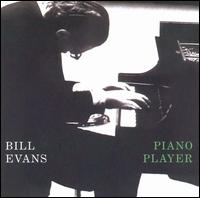
Piano Player is a compilation of recordings featuring jazz pianist Bill Evans released in 1998 on the Columbia label.
